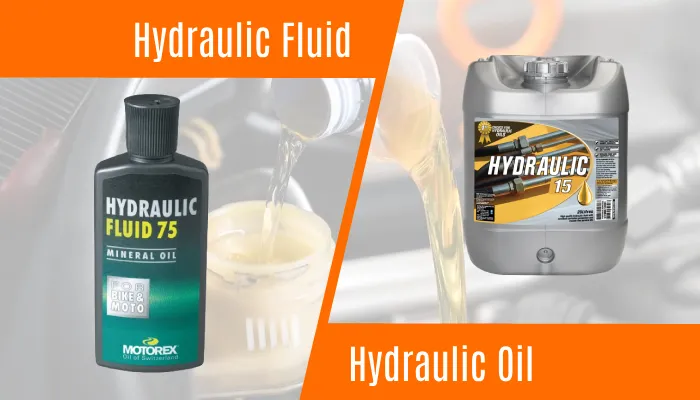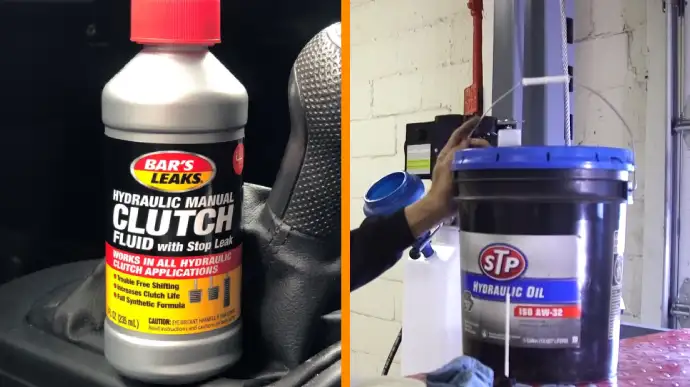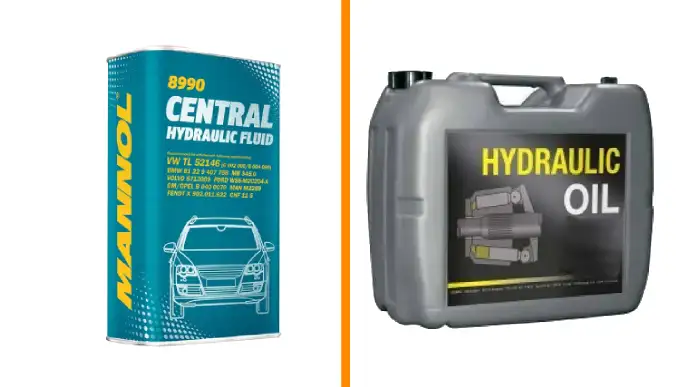Physical Address
304 North Cardinal St.
Dorchester Center, MA 02124
Physical Address
304 North Cardinal St.
Dorchester Center, MA 02124

Hydraulic fluids and oils are essential in various mechanical systems, from vehicles to heavy industrial machinery. Despite sharing a similar purpose of transmitting power and facilitating hydraulic functions, these fluids exhibit significant differences that make them suitable for specific applications.
In vehicles, hydraulic fluids are typically less flammable, prioritizing safety within engine compartments. In contrast, hydraulic oil used in heavy machinery is highly flammable outside engine compartments but less confined and controlled.
In terms of composition, hydraulic fluids come in mineral-based, synthetic, and water-based varieties for versatility. Conversely, hydraulic oils are mainly mineral-based or synthetic, tailored for the extreme conditions of heavy machinery, including vehicles.
Here we will explore the key differences between hydraulic fluid and hydraulic oil, focusing on factors such as flammability, composition, temperature tolerance, and more.

Regarding the differences between hydraulic fluid and hydraulic oil for vehicles, there are several key points to consider.
Hydraulic fluids used in vehicles like automatic transmissions and power steering systems are designed to be less flammable. This is crucial to ensure safety within the engine compartment, where high temperatures and potential ignition sources are present.
The reduced flammability of hydraulic fluids helps to minimize the risk of fire and explosion in these applications.
On the other hand, hydraulic oil used in heavy machinery such as excavators and backhoes is highly flammable. These machines are typically operated in less confined or more controlled environments, which reduces the risk of ignition.
While the higher flammability of hydraulic oil is acceptable in these applications, safety precautions should still be taken to prevent accidents.
In the case of hydraulic fluids, there are three main categories: mineral-based, synthetic, and water-based.
In contrast, hydraulic oils for industrial equipment are typically mineral-based or synthetic. The choice between the two depends on the operating conditions and the specific requirements of the equipment.
Consider their specific characteristics and capabilities to understand the differences between hydraulic fluid and oil.
Hydraulic fluids are engineered to withstand various temperatures and pressures, making them suitable for the diverse conditions encountered in-vehicle systems. They can operate effectively in both high and low-temperature environments, ensuring smooth and efficient operation.
Additionally, hydraulic fluids are designed to handle varying pressure levels, allowing them to deliver consistent performance under different load conditions.
Meanwhile, hydraulic oils used in heavy machinery, including vehicles, must withstand extreme temperatures and high pressures. Even under demanding operating conditions, these oils provide excellent thermal stability and breakdown resistance.
Hydraulic fluids act as lubricants within vehicle systems and ensure the smooth operation of gears and bearings. They have specific viscosity properties that allow them to form a protective film over the surfaces, reducing friction and wear.
Alternatively, hydraulic oil used in heavy machinery not only provides lubrication but also acts as a heat transfer medium, coolant, and contamination remover. The additional functionality of hydraulic oil is essential in maintaining the performance and longevity of heavy-duty machinery in vehicles.
When considering the differences between hydraulic fluid and hydraulic oil for your vehicle, it’s important to understand their compatibility with sealants.
Hydraulic fluids used in vehicles are typically formulated to be compatible with standard sealants, ensuring a secure and leak-free operation. These fluids have properties that allow them to work effectively with the seals and gaskets commonly found in vehicle hydraulic systems.
On the other hand, hydraulic oil used in industrial equipment may not always be compatible with ordinary sealants. In heavy machinery, where specialized sealants or sealing methods may be required, using hydraulic oil that isn’t compatible with the sealants can result in leaks and system failure.
Viscosity refers to a fluid’s resistance to flow, which is crucial in hydraulic systems. Hydraulic fluids used in vehicles have a specific viscosity range to ensure optimal performance.
They’re designed to flow easily through the various components of the system, such as valves, pumps, and cylinders, without causing excessive friction or wear.
Meanwhile, hydraulic oils used in heavy machinery often have higher viscosities to withstand the higher pressures and temperatures experienced in these applications. The thicker consistency of hydraulic oil allows it to provide better lubrication in heavy-duty hydraulic systems in vehicles.
Hydraulic fluid is specifically designed to meet the unique needs of automatic transmissions, providing essential lubrication, heat dissipation, and sealing properties.
It’s formulated with additives that enhance its performance, such as anti-wear agents, detergents, and friction modifiers. These additives ensure smooth gear shifting, prevent wear and tear on transmission components, and improve overall efficiency.
In contrast, hydraulic oil isn’t recommended for use in automatic transmissions. Its highly flammable nature and different chemical composition make it unsuitable for the specific demands of these vehicle components.
Using hydraulic oil in automatic transmissions can lead to poor performance, increased wear, and potential damage to the transmission system.

The energy transfer capabilities of hydraulic fluids and oil in vehicles differ significantly. Hydraulic fluids, which are used in systems like power steering and power brakes, are designed to transfer energy while ensuring precise control efficiently.
These fluids have a low compressibility, allowing them to transmit force effectively and respond quickly to changes in pressure. Their viscosity is carefully formulated to ensure smooth flow and minimize friction losses.
On the other hand, hydraulic oil in heavy machinery serves as an energy transfer medium for various functions, such as actuating hydraulic cylinders and powering hydraulic motors.
The oil’s viscosity is typically higher than that of hydraulic fluids, providing better lubrication and heat dissipation. It also possesses excellent thermal stability to withstand the high temperatures generated during heavy-duty operations.
Hydraulic fluids, specifically designed for vehicle use, have lower environmental impacts compared to hydraulic oils in heavy machinery. This is primarily due to the fact that hydraulic fluids are formulated to meet emissions and environmental regulations, ensuring that they’re less harmful in case of leaks or spills.
Conversely, hydraulic oils used in heavy machinery may have a higher environmental impact, given their industrial applications. As a result, there are usually stricter regulations and requirements for containment and cleanup when dealing with hydraulic oil spills.
Hydraulic fluids, formulated specifically for automotive use, tend to be more cost-effective. They’re designed to meet the specific needs of vehicle systems without the additional characteristics required in industrial applications. This targeted formulation allows for a more affordable price point.
Conversely, hydraulic oil, tailored for heavy machinery, including vehicles, may be more expensive. This is due to its specialized composition and capabilities essential for the harsh operating conditions found in braking, suspension, and other aspects of vehicle performance.
The higher cost of hydraulic oil is justified by its ability to withstand extreme temperatures, high pressures, and heavy loads.
| Feature | Hydraulic Fluids (Vehicle) | Hydraulic Oils (Heavy Machinery) |
| Flammability | Less flammable for safety in engine compartments. | Highly flammable but acceptable in controlled environments. |
| Fluid Varieties | Mineral-based, synthetic, and water-based. | Mostly mineral-based or synthetic, depending on equipment requirements. |
| Temperature & Pressure | Engineered for diverse temperatures and pressures in vehicles. | Withstands extreme temperatures and pressures in heavy machinery. |
| Lubrication | Acts as a lubricant for gears and bearings in-vehicle systems. | Provides lubrication, heat transfer, coolant, and contamination removal in heavy machinery. |
| Compatibility with Sealants | Formulated to be compatible with standard sealants in vehicles. | Compatibility may vary, and specialized sealants may be required in heavy machinery. |
| Viscosity & Flow | Specific viscosity range for optimal performance in vehicles. | Higher viscosities for better lubrication in heavy-duty applications. |
| Use in Automatic Transmissions | Formulated for automatic transmissions, with additives for performance. | Not recommended for use in automatic transmissions due to flammability and different composition. |
| Energy Transfer | Low compressibility for precise control and efficiency. | Higher viscosity for better lubrication and heat dissipation in heavy-duty applications. |
| Environmental Considerations | Lower environmental impact, formulated to meet regulations. | May have a higher environmental impact, subject to stricter regulations in heavy machinery applications. |
While hydraulic fluid is a type of hydraulic oil, it’s primarily used in automatic transmissions and when flammability is a concern instead of hydraulic oil.
However, it’s crucial to note that not all hydraulic fluids are suitable for use as hydraulic oil. Hydraulic oils have specific viscosity and lubricating properties that are necessary for the proper functioning of hydraulic systems.
Using the wrong type of hydraulic fluid as hydraulic oil, can lead to reduced performance, increased wear and tear, and potential damage to the system.
Another term for hydraulic fluid is known as power transmission oil. This type of fluid is specifically designed for hydrodynamic applications. It transmits power from one component to another within a hydraulic system.
Power-transmission oil is formulated to provide lubrication, reduce friction, and dissipate heat to ensure smooth and efficient operation of hydraulic systems.
It’s important to note that power transmission oil is different from hydraulic oil, which is used for hydrostatic applications where high pressures and low flow rates are involved. Hydraulic oil is designed to provide both lubrication and power transmission in these specific conditions.
Hydraulic oils aren’t all the same, as they can vary in composition and properties depending on the specific application. The chemical makeup of hydraulic oil can take many forms, ranging from full synthetic to water-based fluids.
Full synthetic hydraulic oils are designed to handle drastic temperature and pressure swings, making them suitable for applications where extreme conditions are present.
On the other hand, water-based fluids are used when there’s a fire risk, as they have a higher flash point and lower flammability compared to other types of hydraulic oils.

10w40 is a multi-viscosity engine oil commonly used in automotive applications. While it may seem tempting to use it as hydraulic oil due to its availability and similar viscosity, it isn’t recommended.
Engine oil contains detergent additives that can harm the neoprene seals in hydraulic systems. These additives can cause premature and catastrophic seal failure, leading to leaks and potential system damage.
Furthermore, hydraulic systems require specific properties in their oil, such as anti-wear, anti-foam, and corrosion protection, which may not be present in 10w40 engine oil.
Hydraulic fluid versus hydraulic oil is not only a matter of nomenclature but also directly impacts the performance, safety, and longevity of hydraulic systems.
There are many types of hydraulic fluids used in vehicle transmissions, steering systems, and heavy machinery, each serving a special purpose. The differences in composition, temperature and pressure tolerance, lubrication capabilities, and compatibility with sealants make them distinct choices for specific applications.
To ensure the smooth and reliable operation of machinery and vehicles, engineers, mechanics, and operators must be aware of these disparities. By using the correct hydraulic oil, you can ensure optimal performance and avoid costly repairs.